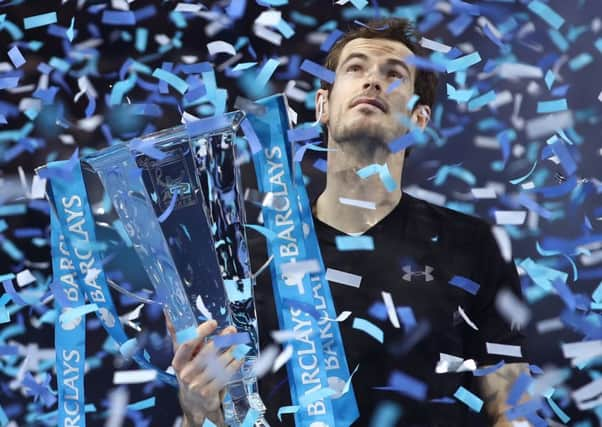Martyn McLaughlin: Knighthood would be least prized of Murray's successes


There is no greater example of meritocratic achievement than the gilded career of Andy Murray.
From the sacrifice of his teenage years, spent honing his skills at Barcelona’s Sánchez-Casal Academy, to the doubts that were expressed over his fitness, demeanour, and focus, he has faced the hardest of battles and won them all. Now, as we well know, he has emerged triumphant in the ultimate war.
Advertisement
Hide AdAdvertisement
Hide AdLong before he forged himself into the world’s best tennis player, a nation sympathised with the angular young boy from Dunblane. We admired his raw talent and pluck but his emergence seemed ill-timed. How could this youth hope to compete against Roger Federer, Rafael Nadal and Novak Djokovic, three of the best players to have picked up a racquet?
The scenario seemed to fit the time-honoured fatalistic Scottish sporting narrative, one in which determined underdogs are predestined to falter just as glory is within their grasp. Over 12 pained years, however, Murray changed his story, and with it, our own. He proved us wrong not with luck, but perseverance and fortitude.
Thanks to him, we have become comfortable with success, expectant of it even. We take pride in the knowledge that the triumvirate has become a quadrumvirate and one of our own is, for the moment at least, its leading light.
Other young hopefuls making their way in his sport must now look on from the outside with a mixture of fear and admiration, wondering how to breach the ranks of the elite.
Is there any greater accolade? That is a question only the man himself can answer.
He has never shown arrogance or, worse, self-entitlement, a surefire kiss of death for a competitor.
The haul of trophies he has accumulated on that long journey from Dunblane to pre-eminence in his sport is displayed in a modest cabinet in his Surrey home. They matter, though not as much as the effort that went into winning them.
With its crushing lows and exultant highs, Murray’s ascent to world number one has been an instructive example of bravery, endurance and determination. He assessed the challenges that lay ahead before remoulding his body and mind to overcome them. That, I suspect, is what gives him the most satisfaction, and it is why he will be remembered for generations to come.
Advertisement
Hide AdAdvertisement
Hide AdIt is ironic, then, that the public is so insistent that a player who has scaled the objective heights of his chosen sport will remain somehow unfulfilled until he is endorsed by the subjective patronage of Britain’s outmoded honours system.
Reports that Murray is in line for a knighthood are as predictable as dark clouds encroaching on a sunkissed SW19. Such calls have been made with increasingly regularity and cynicism in recent years. In the aftermath of Murray’s first Wimbledon title in 2013, David Cameron and Alex Salmond were unusually united in championing his case for the country’s highest honour.
Yet the man himself played down the idea that he would receive a knighthood. “It would be a nice thing to be offered,” he said.
“I suppose the nation has waited a long time and that may be why it is being suggested, but I don’t think it merits that.”
It was a modest and perceptive rebuttal, noting that any such honour would be reflection of a wider history rather the first notable chapter in his own personal one. It was achievement that mattered, not confounding an 77 year old hex.
The clamour returned after Murray’s integral role in Britain’s Davis Cup win, and again this summer following his Olympics triumph and second Wimbledon title. All were significant triumphs, yet the celebrations were always qualified by rhetorical questions lodged via online petitions, social media posts, even early day motions – surely he had now done enough to warrant the tap of a sword on his shoulder?
The fact the issue is never far away from the forum of public debate suggests an inability to appreciate the magnitude of his successes in isolation.
There is joy and prestige with each tournament victory, but even in cumulation, they do not seem capable of providing contentment.
Advertisement
Hide AdAdvertisement
Hide AdThere lingers a curious notion which is frankly dismissive of Murray’s sporting prowess. Its subtext warns that true recognition will only come once his sporting accomplishments are consummated by Whitehall’s nod.
There are, of course, several good reasons to grant Murray a knighthood. His lifelong dedication to his profession has inspired a generation and his charitable work is commendable. Indeed, having accepted an OBE in 2012, he is not opposed to the honours system and would presumably agree to an upgrade with humility and gratitude.
At the same time, he more than anyone would be aware of the incongruity of the occasion.
The status of a knighthood has become a prism through which the public demand instant gratification, making the case for their heroes and icons. Murray’s success has been pained and hard won.
There is also an important question which should be asked at the outset of the process. What would such a title mean to Murray’s reputation? The automacity with which honours are now handed about to Britain’s Olympians has created a sense of expectation which drowns out such quaint considerations.
The answer is obvious: nothing. He would not be defined or emboldened by a knighthood, nor would it render him complacent. He has been the agent of his own greatness. We would do well to remember what he has already won, not what may elude him.